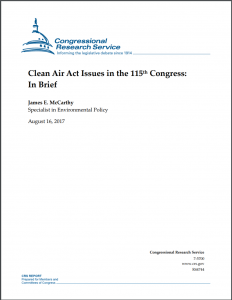Full Title: Clean Air Act Issues in the 115 the Congress: In Brief
Author(s): James E. McCarthy
Publisher(s): Congressional Research Service
Publication Date: August 1, 2017
Full Text: Download Resource
Description (excerpt):
In the 115th Congress, and in the executive and judicial branches, review of regulations issued under the Obama Administration, with the possibility of their modification or repeal, has been the main focus of interest on Clean Air Act issues in 2017. Of particular interest are the ambient air quality standards for ozone promulgated by the Environmental Protection Agency (EPA) in October 2015 and various EPA rules to regulate greenhouse gas (GHG) emissions from power plants, cars and trucks, and the oil and gas sector.
Reducing GHG emissions to address climate change was a major goal of President Obama, but, for a variety of reasons, many in Congress have been opposed to it. In the absence of congressional action, President Obama directed EPA to promulgate GHG emission standards using existing Clean Air Act authority. This authority has been upheld on three occasions by the Supreme Court, but it remains controversial in Congress and among Cabinet appointees of the Trump Administration.
The Clean Power Plan (CPP), which would limit GHG emissions from existing fossil-fueled power plants, was a frequent topic in articles earlier this year discussing the 115th Congress’s priorities; in the near term, however, the courts and EPA seem the more likely venues for action. Implementation of the CPP has been stayed by the Supreme Court since February 2016, pending the completion of judicial review. Challenges to the rule had been filed with the D.C. Circuit Court of Appeals by more than 100 parties, including 27 states. The D.C. Circuit heard oral argument in the case in September 2016; as of this writing, the court has not issued a decision.
